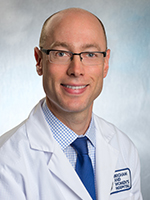Mass General Brigham is monitoring the weather's impact on our services. For real-time updates and service changes, please check our Alerts page.
Header Skipped.
Mass General Brigham is monitoring the weather's impact on our services. For real-time updates and service changes, please check our Alerts page.
Header Skipped.
Department of Radiology

Medical Director
Computed Tomography (CT)
Director
Cross Sectional Interventional Radiology (CSIR)
Computed tomography is commonly referred to as CT or a CAT scan. It combines an X-ray with a computer to produce very detailed images of the body. CT is used to help diagnose and treat medical conditions related to internal organs, soft tissue, bones and blood vessels. The images from a CT scan are “cross-sections” of your body, and can be thought of as if you were looking at individual slices from a loaf of bread.
The following information pertains to all patients having a CT scan. Where noted, special instructions are for patients receiving a contrast agent. A contrast agent is a substance that enhances the images taken during the CT scan.
The benefits of CT are extraordinary in helping to diagnose or rule out conditions. CT is considered safe, but there are some things to know. CT uses radiation to produce images. At Brigham and Women’s Faulkner Hospital, we use state-of-the-art technology to minimize radiation dose. We also screen all patients for allergies and other conditions if they are receiving an intravenous contrast injection. You can be assured that the benefit of performing a CT scan outweighs the minimal risk of radiation exposure or contrast injection.
All CT exam requests are reviewed by a radiologist beforehand. Instructions are given to the technologists on how to perform the exam after the benefits and risks have been reviewed by the radiologist. Patients should inform staff if they are pregnant, have allergies or have impaired kidney function. The technologist or radiologist will answer any questions you may have at the time of your appointment.
A CT technologist will perform your exam. All CT technologists at Brigham and Women’s Faulkner Hospital have passed a certification exam in CT given by the American Registry of Radiologic Technologists and are licensed by the Massachusetts Department of Public Health’s Radiation Control Program. The technologist will perform the CT scan and answer any questions you may have.
The CT technologist will greet you after you have checked into the Radiology Department. You will be asked to complete a screening form if you are receiving an IV or oral contrast. The screening form provides information for your safety. It also assists the radiologist in the best scanning option for the best diagnosis. The screening form will need to be completed upon each CT exam return where IV or oral contrast is required.
Your completed exam will be read by a board-certified radiologist. A radiologist is a physician trained to diagnose conditions seen on medical imaging studies. The radiologist will send the report to your ordering provider.
The CT technologist will greet you in the waiting room and escort you into the exam room. The technologist will explain everything that will happen during the scan. You will be helped onto the table and positioned correctly. If you have difficulty staying very still, there is a safety belt that can help you remain in place. Even slight movement blurs the CT images.
The CT technologist controls the scanner from an adjacent room where they can still see and hear you. You will be moved slightly after each scan, although you may not notice this.
When the CT scan is complete, the technologist will make sure that all of the information the doctor will need has been collected.
Your time in the CT scan room will vary but is generally between 10 and 20 minutes. For multiple studies or procedures, times will be longer.
Once the exam is complete, the technologist will help you off the table. You may leave the CT department immediately and resume your normal diet. If you have had a contrast media injection, drink plenty of fluids for the next two days unless instructed otherwise. Speak with your doctor if you have difficulty moving your bowels following a CT scan that used oral contrast agent.
Some patients experience an adverse reaction to the contrast agent, but this rarely happens. Contact your doctor if you develop a skin rash, difficulty breathing, nausea, or vomiting. If your symptoms are severe, call 911 or go to the nearest emergency room.
The technologist cannot discuss the results of the scan with you. Results for your exam are generally available for your provider to view on the same day of your exam. CT exams are interpreted by a board-certified radiologist and a detailed report will be sent to your ordering provider who will discuss them with you. Results are available in Mass General Brigham’s Patient Gateway.
Appointments are available Monday through Friday from 7 am to 8 pm. Saturday and Sunday appointments are available from 8 am to 5:15 pm.
Offering comprehensive medical, surgical and psychiatric care as well as complete emergency, ambulatory and diagnostic services to residents of southwest Boston and the surrounding suburbs.
Learn more about BWFH